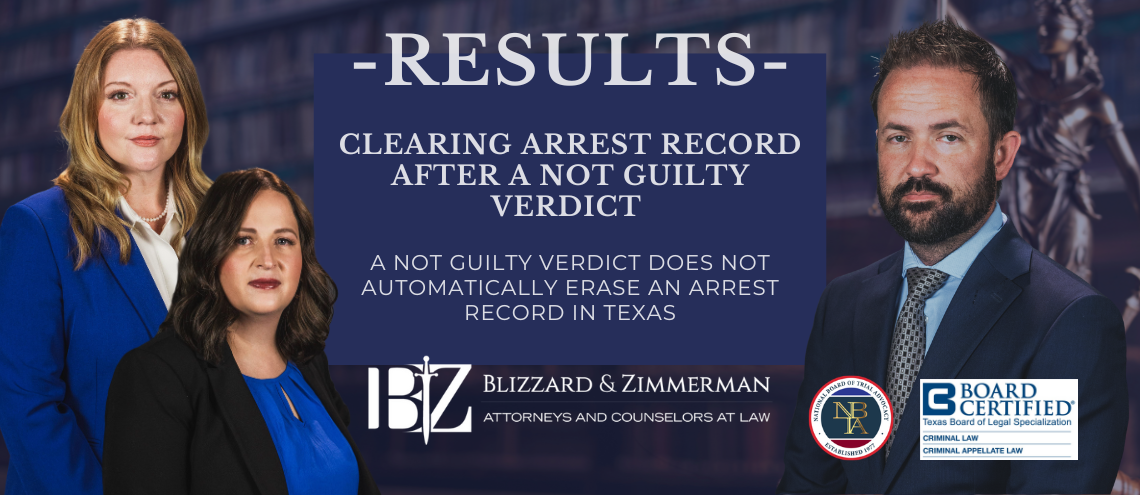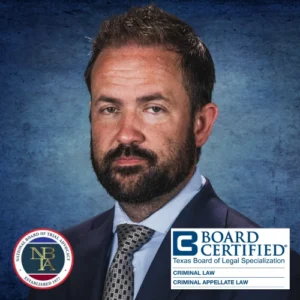
RESULTS: Clearing an Arrest Record After a Not Guilty Verdict
Being found “not guilty” in a criminal trial is life-changing, but the fight does not end there. Even after an acquittal, an arrest record can continue to follow someone, showing up on background checks, job applications, and housing opportunities.
Attorney Jacob Blizzard represented our client, who was facing multiple counts of sexual assault of a child. After presenting his defense, the jury returned the correct verdict: Not Guilty. While justice prevailed, the reality was that the arrest itself remained on his record.
Unfortunately, a not guilty verdict does not automatically erase an arrest record in Texas. This is where an important legal remedy comes into play: the petition for expunction.
What Is an Expunction?
An expunction is a court-ordered process that permanently erases all records of an arrest or charge. Once granted, government agencies and private databases must destroy those records, making it as if the arrest never happened. This gives clients the chance to move forward with a clean slate.
Our Client’s Expunction Granted
After his acquittal, attorneys Sarah Durham and Morgan Walker filed a petition for expunction on our client’s behalf. Recently, the court granted it. This means all records of his arrest and charges are wiped clean. Today, he is not only free but able to build his future without the weight of an unfair record.
Why This Matters
A criminal record, even without a conviction, can have devastating consequences. Employers, landlords, and even volunteer organizations often rely on background checks, and an arrest record can unfairly close doors. Expunctions provide a way to restore dignity and opportunity to those who should never have had a record in the first place. In this case, justice did not stop with a not guilty verdict, it continued with a clean slate through expunction.
If you or someone you know has been found not guilty but still are still dealing with the effects of an arrest record, our team can help.
About The Attorneys



Jacob Blizzard is a Texas board-certified expert in criminal law and criminal appeals, dedicated to providing exceptional defense services. He is also nationally certified in criminal trial law by the National Board of Trial Advocacy. His expertise and tactical negotiation skills are instrumental in achieving positive results for his clients, highlighting his commitment to protecting client rights and minimizing the impact of criminal charges on their lives.
Among over 100,000 licensed attorneys in Texas, Mr. Blizzard is one of only 87 to hold dual board certifications in both criminal law and criminal appellate law, positioning him within the top 0.087% of attorneys in the state. He’s among only 32 in Texas with NBTA certification in criminal trial law. His expertise and dedication make him a leading figure in his area of practice.
Sarah Durham stands at the helm of our post-conviction division, she is a beacon of hope for those who seek it most. Under her stewardship, the division has reached significant milestones, tirelessly advocating for those unjustly behind bars. Armed with her law degree and a master’s in education, Sarah’s approach intertwines legal principle with human compassion. She’s honored to be a Super Lawyers 2025 Rising Star.
Morgan Walker is a dedicated advocate with the skill and experience to successfully guide clients through both Texas state and federal appeals. She is relentless in her pursuit of justice and steadfast in protecting her clients’ rights at every stage of the process.
Disclaimer
Attorneys Jacob Blizzard, Sarah Durham, and Morgan Walker work tirelessly to achieve the greatest possible results for each of our clients and their families. This is one of their successful results, settlements, and verdicts. Every case and client is unique and depends upon the individual facts and circumstances of each case. Clients may or may not obtain the same or similar results in each case.

